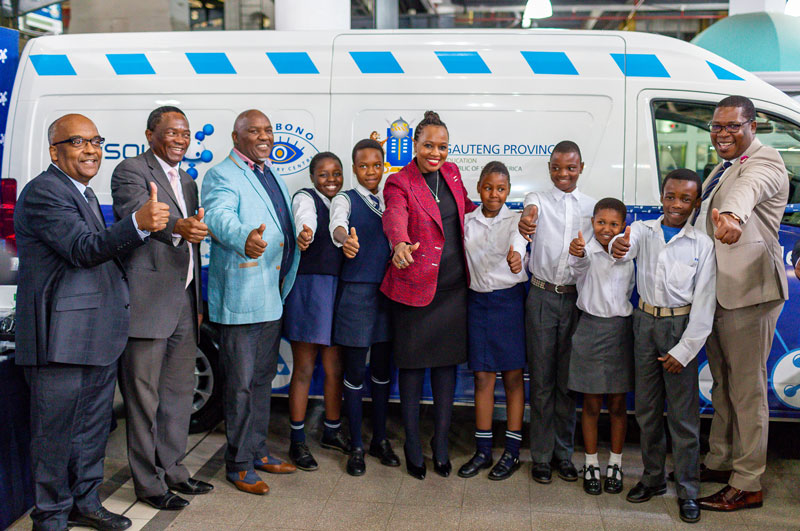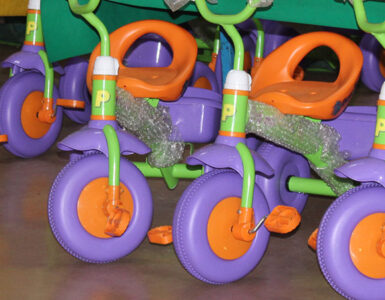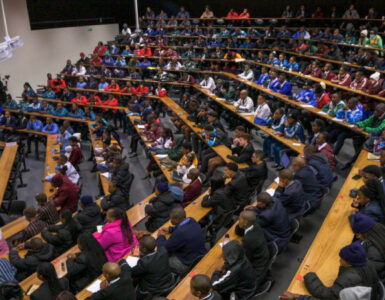Earlier this month, the Sasol Foundation handed over yet another one-of-a kind Mobile Science Laboratory to the Sci-Bono Discovery Centre in Newtown, Johannesburg in the spirit of supporting programmes that drive access to STEM education.
The lab, which is the tenth of its kind nationally, will bring practical science education to thousands of learners in underprivileged schools in the southern and western districts of Johannesburg.
The latest Trends in International Mathematics and Science Study (TIMSS) of 2015 showed that, out of 39 countries surveyed globally, South Africa’s national average score for grade nine mathematics was in 38th position. In science, the country was in last place.
As a result, university graduation in science, technology, engineering and mathematics (STEM) related courses is at a low 20%, according to the National Science and Technology Forum.
“We need to develop an ecosystem of science and mathematics education that sustains the interest and passion for these vitally important fields, which will further contribute to South Africa’s ability to compete globally in manufacturing, medicine, energy, defence and tech innovation,” said Cindy Mogotsi, Senior Vice President Corporate Affairs at Sasol.
“For this reason, Sasol as a credible stakeholder partner to government, believes in working collaboratively with all our other stakeholders to find solutions to address the challenges and bottlenecks in our education system to enable economic growth. Throughout our near 70 year long history, we are proud to have played a pivotal role in taking South Africa forward by driving broader industrialisation and socio-economic development,” she says.
South Africa has seen some improvements in our education system and 81.3% of 2019’s grade 12 learners graduated, the highest matric pass rate since the founding of our democracy. However, more still needs to be done to enable access to facilities such as equipped science laboratories.
The Mobile Science Lab Programme is the Sasol Foundation’s contribution to supporting government in addressing this challenge. First introduced in 2014 as a partnership between the Sasol Foundation, the Department of Science and Innovation (DSI) and the South African Agency for Science and Technology, the programme has grown to comprise nine laboratories across the country.
A Mobile Science Lab is an innovative solution by the Sasol Foundation that targets schools which lack the necessary apparatus for science, particularly in the underprivileged parts of the country. As the name denotes, these vehicles travel on a daily basis to schools where science experiments are performed with learners and teachers in their classrooms. The facility consists of a custom-designed and well-equipped vehicle that is used to transport science apparatus and chemicals to schools in various parts of the country in order to conduct hands-on practical work with teachers and learners in their classrooms. They are meant to be serious game changers in the school learning environment.
Each mobile lab can serve up to 30 schools per year, when fully utilised, therefore the impact and footprint of what is achieved is also more significant. The Sci-Bono Mobile Lab will serve township schools in the western and southern parts of Johannesburg.
To date, this partnership model has been working smoothly, with schools served by the facility reporting significant improvement in the performance of learners in science-related subjects.
The impact of this initiative was also positively evaluated by an independent monitoring and evaluation agency in 2019.
“As we continue to seek new partners and opportunities, we are confident that we will unearth powerful new solutions to scale up the project, improve its impact and expand our footprint in a cost-effective way,” said Mogotsi.






